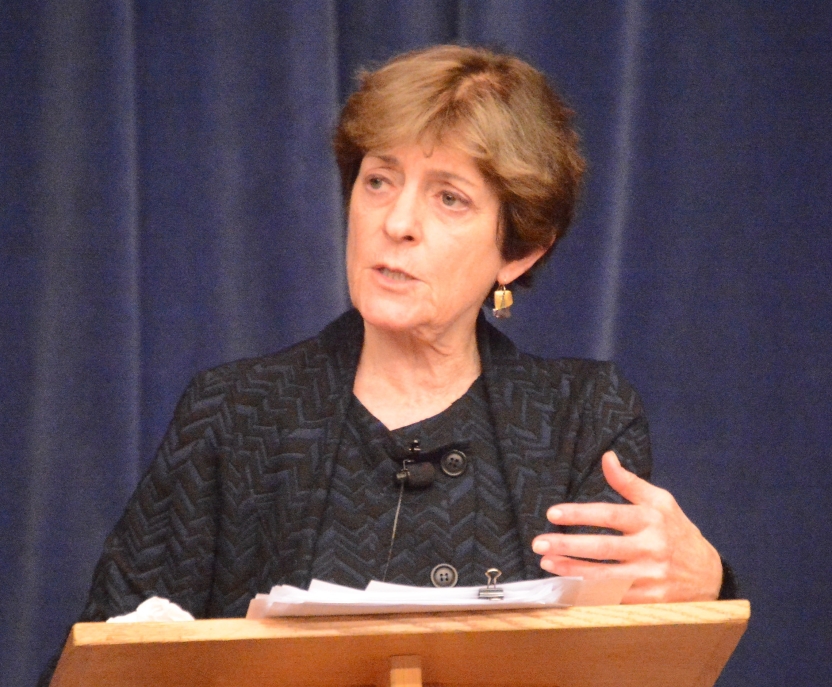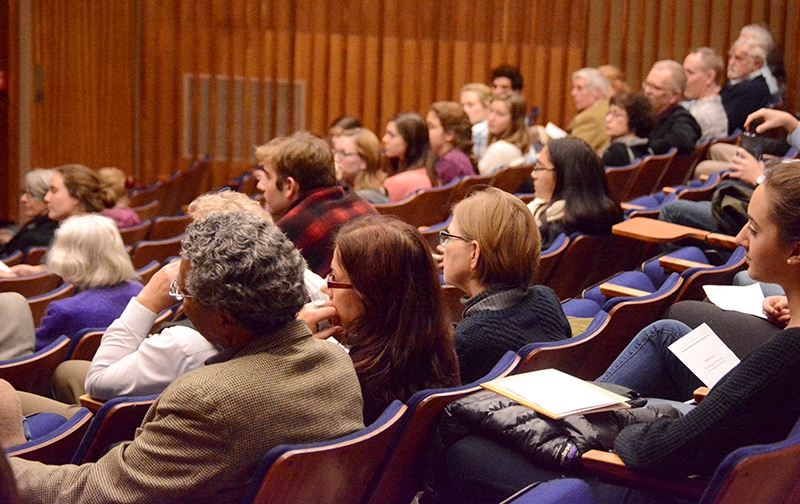Nancy Cott Delivers the Annual Grant Lecture in American History

MIDDLEBURY, Vt. – Harvard historian Nancy F. Cott said the Founding Fathers’ views on citizenship and marriage laid the groundwork for the Supreme Court’s landmark decision in Obergefell v. Hodges – the decision that legalized same-sex marriage in America.
Appearing at Middlebury College on November 12 for the Charles S. Grant Memorial Lecture Series, Professor Cott said marriage laws have always had public, private, and political meaning in the U.S. “Marriage and the marital families it creates have long been linked to citizenship in American history,” she said.
“This strong tie to citizenship goes back to the era of the American Revolution. The founders assumed that the social relations of marital families were directly linked to the nation’s public life and even to the very character of the sovereign people.”
Marriage “brought a predictable household order to society” and was “a crucial site for fostering virtuous citizens and virtuous civic qualities” in the new republic. “The founders required that citizens would appreciate their civic obligations and commit themselves to advancing the public good of the polity,” Cott explained.
In a 40-minute lecture titled “The Rei(g)n of Marriage: An American History,” Cott established that the family structure was “the linchpin” of political, economic, and social order in the early years of our nation. Next she explained her use of “rein” and “reign” and, in the final analysis, connected citizenship and marriage to the June 25, 2015, Supreme Court decision.
From the late 1700s through the following century, when a man married “he became by law the head of his household. He was legally obliged to control and support his wife and other dependents. Anglo-American legal doctrine positioned husbands that way.
“Imposing these legal obligations on men as husbands was a major civic purpose of marriage. Marriage put this regulatory rein on men, and I mean ‘rein’ without the ‘g,’ while it allowed them to ‘reign’ with the ‘g’ in there – to reign over their families, to rule over their families.”
Cott, the Jonathan Trumbull professor of American history, emphasized that free women were citizens, “but free women’s citizenship was categorically inferior to men’s because upon marrying, a woman became a dependent similar to a child. No married woman, no child, no apprentice, and no slave had legal or economic independence because they were bound to labor for the head of household and bound to obey him and be represented by him.”
“But that was then and this is now,” said Cott, “and thankfully the rule of the male head of household over his wife and other dependents is archaic, and so is the family governance function it embodied. But that didn’t happen quickly. It took 200 years” – and the passage of the 13th, 14th, and 15th Amendments, the women’s rights movement of the 1970s, and the 5-4 Supreme Court decision legalizing same-sex marriage – to make male dominance over marriage disappear.

Marital requirements today are “gender neutral and completely symmetrical. Now the responsibility of support is not gender-designated; both spouses are required to support each other and support their children.”
And yet the Harvard historian said the struggle for equal rights is far from over in America.
“Gender equality is belied by gender asymmetries in other parts of our society: our labor market, popular culture, religious expectations, and the social habits and conventions about marriage. The law has stepped out of prescribing how people should behave in marriage, but I argue that the citizenship dimension of marriage still persists. Government at all levels grants married couples benefits and rights not available to other pairs and not available to single people. Marriage reigns as the state-preferred form an adult life should take.”
Cott devoted the final 10 minutes of her lecture to a close reading of Justice Anthony Kennedy’s majority opinion in Obergefell v. Hodges. She said gay and lesbian couples “felt their citizenship was impaired by being prevent from marrying,” and Kennedy “embraced that view on the matter… He reiterated many of the themes I have been tracing [here today], and he called marriage ‘a building block of our national community.’”
Justice Kennedy’s opinion, in Cott’s words, affirmed that excluding gay and lesbian couples from marriage “locked them out of a central institution of the nation’s society” and “deprived them of rights to participate in the polity as full citizens and be regarded as such.”
Middlebury’s William Rehnquist professor of history, James Ralph, opened the evening by introducing Nancy Cott to the gathering of about 150 students, faculty, staff, and area residents. Ralph mentioned the books Cott has written on womanhood, feminism, and marriage, and the legal briefs she has helped write including one in Obergefell v. Hodges.
“Nancy Cott certainly enhances the remarkable roster of historians who have delivered Grant lectures at Middlebury College,” said Ralph.
The Charles S. Grant Memorial Lecture honors a former Middlebury professor of history who passed away in 1961 at the age of 44. Previous speakers in the series have included Arthur M. Schlesinger Jr., Laurel Thatcher Ulrich, Robert Dallek, Pauline Maier, and David McCullough.
– With reporting and photography by Robert Keren

